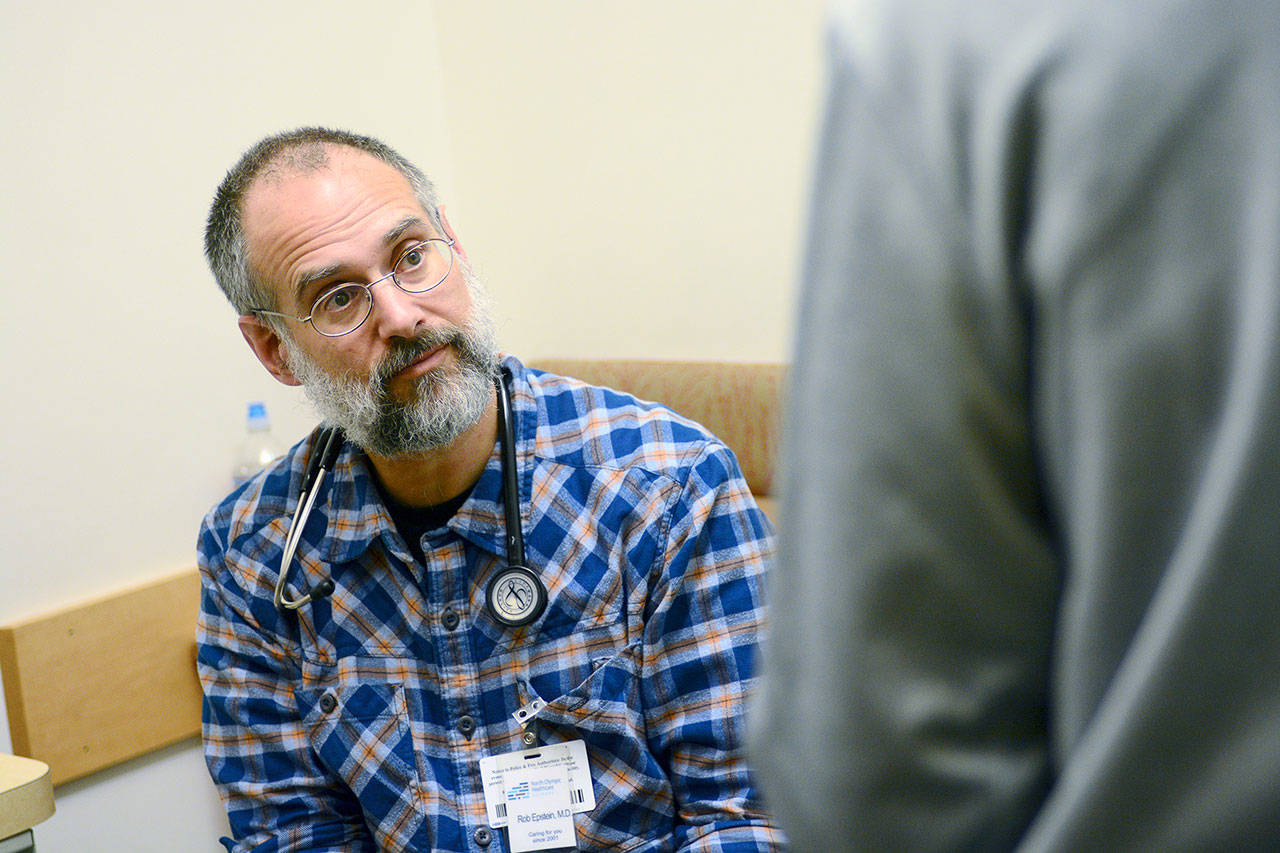PORT ANGELES — North Olympic Healthcare Network plans to nearly triple the capacity of a program that provides medication for addicts trying to get off opioids after being awarded $250,000 in funding from the Salish Behavioral Health Organization.
NOHN will transition over the next couple months into having a nurse care manager model for its medicine-assisted treatment program and has hired more providers, allowing it to increase its current capacity of about 120 Suboxone patients up to about 300, said CEO Dr. Michael Maxwell.
“We’re trying to do this as an integrated part of their primary care,” Maxwell said.
Suboxone is a drug that also contains Naloxone, used to help people with opioid use disorder stabilize their lives.
It is a partial agonist, meaning it fulfills the physical craving for opioids but doesn’t produce the same high. Naloxone counteracts opioid overdoses and helps prevent people from abusing Suboxone.
Maxwell said NOHN is focusing on hiring staff within the next month or two to start the program. He expects the program to expand by summer.
The expansion is part of an ongoing community effort to increase access to medication-assisted treatment, said Clallam County Health Officer Dr. Chris Frank.
Others that prescribe in Clallam County include the Jamestown Family Health Clinic and will include Olympic Medical Physicians later this year. The Clallam County jail also has a Suboxone program.
“Expanding evidence-based treatment options is one of our main goals in addressing the opioid crisis,” Frank said. “I applaud [NOHN] for stepping up and trying to provide really excellent evidence-based care in this challenging-to-manage population.”
Frank said there are about 16 providers in Clallam County certified to prescribe Suboxone, though not all are actively prescribing.
NOHN now has four doctors who can prescribe Suboxone, with four more joining the community health center in the coming months, Maxwell said.
Maxwell said two physician assistants will soon be certified to prescribe Suboxone.
So many have been interested in the program that NOHN had stopped keeping a wait list, said Chief Medical Officer Katrina Weller.
The wait list was so long that by the time there was room for people, many were no longer ready for treatment.
“When people are ready to get off heroin, you need to help them get off heroin,” Weller said. “That’s why we like to be ready as soon as somebody walks in the door.”
People who try NOHN’s Suboxone program have typically already been in and out of treatment programs and tried to kick their addiction on their own, she said.
Weller doesn’t know of any patients who first turned to Suboxone to get off heroin.
“Many people that are coming in have tried to go clean many times,” Weller said. “Many of these folks have done inpatient and that didn’t work.”
She said there is work up front to make sure a patient is the right fit for their program.
“There’s a lot of things that happen even before you accept a patient as a Suboxone patient,” she said.
Weller said mental health and medical assessments, drug screenings and education about the program are required before anyone is accepted.
They are also required to be in treatment for substance abuse.
“You do not get Suboxone unless you are involved in a substance use disorder treatment program,” Weller said. “The Suboxone is just getting somebody’s brain stable so they can get treatment for their substance use disorder.”
NOHN’s medicine-assisted treatment program is not a substance use disorder treatment program, she said.
She said that in about 75 percent of patients, the goal is to eventually wean them off Suboxone and have them completely off opioids.
“That’s the goal for most patients,” Weller said. “There are going to be some people who need to be on it forever, but we will try to get everybody off if we can.”
The other 25 percent, she said, have a permanent change in their brain that will make them never feel “normal” without opioids in their system.
There isn’t a strict process for getting people off Suboxone, Weller said, adding that it is often based on what is going on in their lives.
If it’s a more stressful time, it might not be the right time to reduce doses, she said.
Weller said NOHN’s Suboxone program isn’t the solution to ending the opioid epidemic and that it’s just one way of addressing the problem.
“We’re just putting out fires,” she said. “If you want to prevent the fires in the first place, you decrease the amount of opioids out there in general.
“Many people that end up on heroin started off on prescription narcotics.”
Weller said NOHN has a chronic pain advisory board to help it treat chronic pain without opioids.
________
Reporter Jesse Major can be reached at 360-452-2345, ext. 56250, or at jmajor@peninsuladailynews.com.

